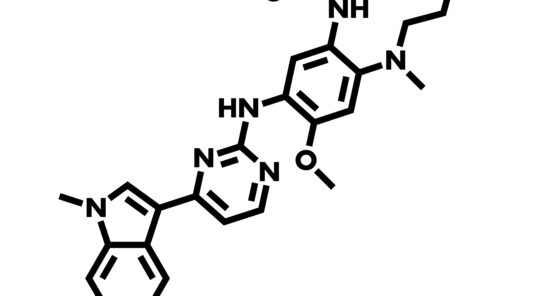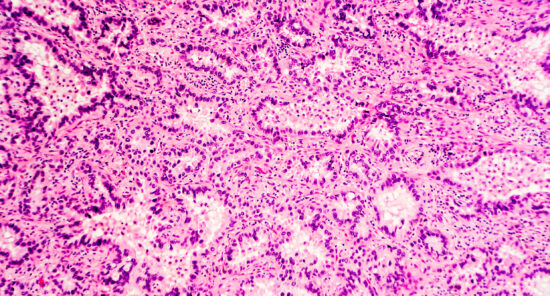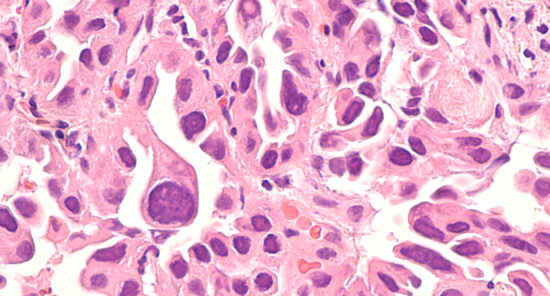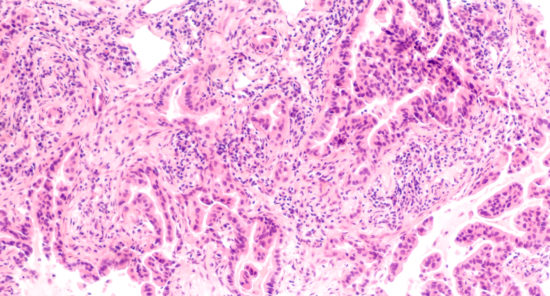Credit: Original article published here.In a recent study, published in Thoracic Cancer, researchers evaluated the safety and efficacy of osimertinib plus bevacizumab in patients with non-small cell lung cancer (NSCLC) with brain metastases and epidermal growth factor receptor (EGFR) mutations. According to the study’s authors, the combination was safe and effective as a first-line therapy among patients with NSCLC with EGFR mutations and brain metastasis. They noted this was, to their knowledge, the first study to report on this osimertinib with bevacizumab in this population. Improved NSCLC Treatment With Osimertinib and Bevacizumab The single-arm trial enrolled 52 treatment-naïve patients with NSCLC, of which 17 had EGFR 19 deletion mutations and 35 had EGFR L858R mutations. The primary end point of the study was median progression-free survival (mPFS), and secondary end points included median overall survival (mOS), response rates, and safety. Researchers reported the osimertinib plus bevacizumab regimen demonstrated an objective response rate of 75.0% and a disease control rate of 96.2%. The participants had a mPFS of 17.0 months (95% CI, 11.46-22.54), while the mOS was not reached. The mPFS was 20.0 months (95% CI, 14.56-25.44) in patients with EGFR 19 del mutations and 17.0 months (95% CI, 13.28-20.72) in
Credit: Original article published here.In a recent meta-analysis, published in Cancer, researchers evaluated neoadjuvant immunotherapy in patients with advanced, resectable non-small cell lung cancer (NSCLC). They sought to characterize the safety and efficacy of neoadjuvant immunotherapy and compare it with chemotherapy alone. According to the study’s lead author, Yajing Wu, pooled data of 66 studies suggested that neoadjuvant immunotherapy was safe and effective, and it improved pathologic response rate and survival compared with chemotherapy alone—especially in patients who were positive for programmed cell death ligand-1 (PD-L1) expression. Neoadjuvant Immunotherapy Improves Chemotherapy in Advanced NSCLC The investigators selected 8 randomized controlled trials, 39 prospective nonrandomized trials, and 19 retrospective trials for analysis. All participants had resectable stage I-III NSCLC and received PD-L1, programmed death 1, or cytotoxic T-lymphocyte-associated antigen-4 inhibitors before resection. A Mantel-Haenszel fixed- or random-effect model was used depending on the variable heterogeneity. Authors noted other forms of neoadjuvant and adjuvant therapies were not excluded. According to the report, the overall pooled pathologic complete response rate was 28.1% and the estimated rate of grade ≥3 toxicities was 18.0%. Compared to patients who received chemotherapy alone, those who received neoadjuvant immunotherapy had improvements in: complete response (odds ratio [OR], 7.63;
Credit: Original article published here.Authors of a study, published in Lung Cancer, evaluated real-world data from US patients with metastatic non-squamous (mNSq) non-small cell lung cancer (NSCLC) that progressed on standard of care (SoC) in order to characterize follow-up treatment selections and clinical outcomes in this population. According to the study’s lead author, Hozefa Divan, patients with mNSq NSCLC without driver mutations most commonly received docetaxel in later lines of therapy, while patients with mutations most commonly received one or more lines of tyrosine kinase inhibitors followed by platinum-based chemotherapy in later lines after SoC. The investigators enrolled 400 US adult patients with mNSq NSCLC from the ConcertAI Patient360 NSCLC database who began treatment between 2016 and 2021. Participants were divided into those without (group 1) or with (group 2) suspected targetable EGFR, ALK, or ROS1 mutations. All participants had 1 or more prior lines of therapy and progression on SoC. The primary outcomes of the analyses were real-world progression-free survival (rwPFS) and real-world overall survival (rwOS). Most Common Follow-Up Treatments in NSCLC Docetaxel (18.5%) or docetaxel plus ramucirumab (32.4%) were the most common follow-up treatments after progression on SoC in group 1. In group 2, authors noted most patients were treated with
Credit: Original article published here.In the recently completed CheckMate 817 trial, researchers evaluated flat-dose nivolumab plus weight-adjusted ipilimumab as a first-line treatment in patients with metastatic non-small cell lung cancer (NSCLC). According to the study’s authors, the nivolumab plus ipilimumab regimen was associated with durable response and manageable safety in the primary cohort of patients with Eastern Cooperative Oncology Group (ECOG) performance status (PS) of 0-1. The findings were reported in the Journal for the Immunotherapy of Cancer. In addition, the team reported that nivolumab with ipilimumab showed manageable treatment-related toxicity and a clinically meaningful 3-year overall survival (OS) rate in higher-risk subgroups including patients with ECOG PS 2, ECOG PS 0-1 with untreated brain metastases, renal impairment, hepatic impairment, or controlled HIV infection. Investigators noted these findings were comparable to results from previous phase 3 studies on patients with metastatic NSCLC. Nivolumab Plus Ipilimumab Shows Promise for NSCLC The clinical trial enrolled 391 patients with NSCLC in the primary cohort and 198 patients in the special populations cohort. Both groups received nivolumab 240 mg every 2 weeks plus ipilimumab 1 mg per kg every 6 weeks. The primary end points were grade III-IV and grade V immune-mediated adverse events (AEs)





